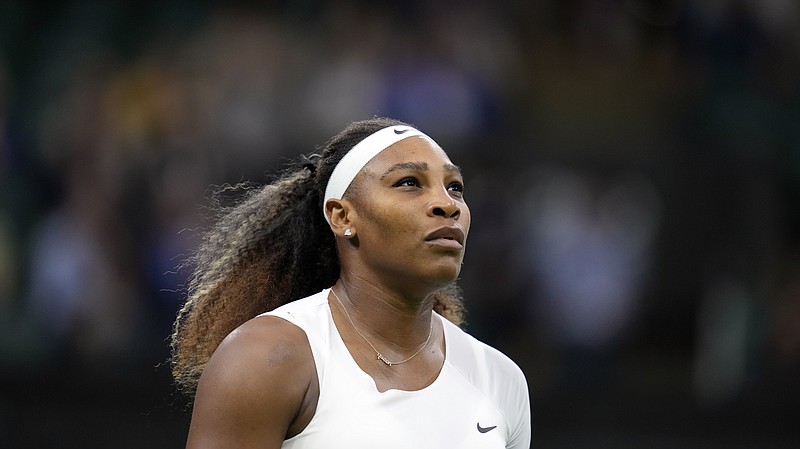Serena Williams added herself to the list of big-name withdrawals from the U.S. Open on Wednesday, pulling out of the year's last Grand Slam tennis tournament because of a torn hamstring.
Williams hasn't competed since injuring her right leg in the first set of her first-round match at Wimbledon in late June.
The American legend, who turns 40 next month, announced her decision to sit out the U.S. Open via a social media post. She joins men's stars Roger Federer and Rafael Nadal in sitting out the competition in New York, where play begins Monday, raising questions about what the future of the sport might look like without them. The draw for the tournament is Thursday.
This will be the first major tournament since 1997 with Williams, Federer and Nadal all missing from the singles' brackets. Williams made her Grand Slam debut at the 1998 Australian Open, while Federer made his the following year and Nadal did so in 2003.
Williams has won 23 Grand Slam singles titles, a record in the professional era; only one player in tennis history owns more, Margaret Court with 24. Federer, Nadal and Novak Djokovic share the men's record of 20 major singles titles.
"After careful consideration and following the advice of my doctors and medical team, I have decided to withdraw from the US Open to allow my body to heal completely from a torn hamstring," Williams wrote in Wednesday's post.
Her note ended with: "I'll see you soon."
Williams' coach, Patrick Mouratoglou, also made a post on social media, saying "we've done everything we could" and adding: "It is heartbreaking, but this is the only possible decision."
Williams has won six singles championships at the U.S. Open, most recently in 2014. In her five appearances at the hard-court tournament at Flushing Meadows since then, she has made it to the final twice - losing to Naomi Osaka in 2018 and Bianca Andreescu in 2019 - and the semifinals three other times, including last year.
Williams' serve, still the best in the game, and powerful groundstrokes have allowed her to remain among the title contenders at the biggest tournaments, especially on hard courts and grass.
This season, she was a semifinalist at the Australian Open in February before losing to eventual champion Osaka. At the French Open, played on red clay, Williams lost in the fourth round to Elena Rybakina.
At Wimbledon, Williams was serving while leading 3-1 in her opening match when her left shoe seemed to lose its traction on the grass while she was hitting a forehand and her right leg flexed awkwardly. She tried to continue but eventually needed to stop playing, only the second mid-match retirement of her Grand Slam career and first since 1998.
Nadal, 35, cited a chronic foot injury last week when announcing he would not play again this season. Federer, 40, who withdrew days before his rival, said he needs another knee surgery to have a "glimmer of hope" of continuing his playing career.
Spectator policy
Spectators will not be required to wear masks or show proof of their vaccination status to attend matches at the U.S. Open when the tournament returns at full capacity, one year after all fans were banned from the event because of the COVID-19 pandemic.
"The goal is not to prevent all cases of COVID. The goal, really, is to be certain that we don't have an outbreak of COVID that's going to be unusual or that we would regret," Dr. Brian Hainline, a U.S. Tennis Association first vice president and member of its medical advisory group, said on a conference call with reporters Wednesday. "We're still relying on the goodwill of people. The unvaccinated - although it's not going to be enforced - they really should be wearing masks. I expect many vaccinated individuals are going to be wearing masks as well."
Fueled by the highly contagious delta variant of the virus, new reported cases of COVID-19 in the country have topped 150,000 a day, the highest level since late January.
Hainline and other USTA officials said Wednesday that the tournament's protocols are based on what has been laid out by the Centers for Disease Control and Prevention and the New York City Department of Public Health.
"This is not a USTA decision or a U.S. Open decision. This is a decision made with New York City," said Hainline, who is also the NCAA's chief medical officer.
Players don't need to be vaccinated to compete; they will be tested for COVID-19 when they arrive in New York and then every four days. A positive result will force the player to isolate for 10 days and withdraw from the tournament.
While players and their team members are allowed to go out in the city during the tournament, a graphic distributed by the USTA reads in bold lettering: "It is highly recommended that everyone exercise caution, especially given the delta variant. Try to avoid large, crowded indoor settings. Socialize only among your team when indoors. Keep masks on indoors even with other fully vaccinated persons who are not in your support team."
